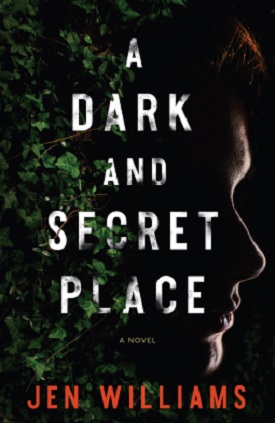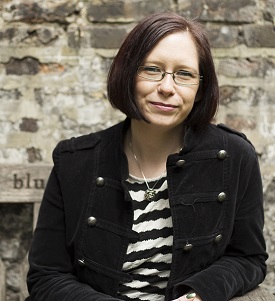 Synopsis:
Synopsis:
Prodigal daughter Heather Evans returns to her family home following her mother’s baffling suicide and makes an alarming discovery: stacks and stacks of carefully preserved letters from notorious serial killer Michael Reave. The “Red Wolf,” as he was dubbed by the press, has been incarcerated for over twenty years, serving a life sentence for the gruesome and ritualistic murders of several women across the country. He has always protested his innocence, but the police have never had any reason to listen to or give credence to his claims.
Now Heather isn’t the only one with cause to reexamine the murders. The body of a young woman has just been found, dismembered and placed inside a tree, the corpse planted with flowers. The crime was committed in exactly the same manner that the Red Wolf once killed and staged his victims. With the monstrous Red Wolf safely locked inside a maximum security prison, who is stalking young women now?
What did Heather’s mother know? Why did she kill herself?
And how well can we ever know our own family members . . . or even ourselves?
Teaming up with Detective Inspector Ben Parker, Heather hopes to find answers for herself and the newest victims of a depraved murderer. Yet to do that, she must speak to Michael Reave herself and expose herself to truths she may not be ready to face.
Something dark is walking in the woods, and it knows her all too well.
Review:

Nonetheless, her first foray into thrillers lives up to its title. A Dark and Secret Place is a dark, atmospheric exploration of a young woman’s search for the truth in the wake of a horrific tragedy. What she discovers is unsettling, upsetting, and related by Williams in a compulsively creepy and frightening manner.
Williams employs alternating narratives in a tale about a young boy who escapes some form of imprisonment, emerging into the woods where he is met by a man who takes him in and raises him. There, under the tutelage and with the encouragement of the old man, the boy’s evil pursuits proceed. Why? Williams answers that question only in part, which may leave some readers frustrated, feeling that the story is incomplete.
In the present day, Heather has returned home after receiving news of her mother’s sudden suicide. Heather and her mother, Colleen, had a troubled relationship, especially after the death of Heather’s father. With him gone, it became clear that he was the one who held their family together, and Colleen blamed his death on Heather. “You know what you’ve done,” she told Heather. Now Colleen is gone, too, and has left a suicide note that Heather shares with her best friend, Nikki. In her final message, Colleen explains that she can no longer live with the things she knows and the decisions she has made over the course of her life. She declares that her actions will not be understood because no one knows about the “awful shadow I’ve lived under forever. All those monsters in the wood never really went away, not for me.” Heather is puzzled by the fact that the note is addressed “to you both,” because, to Heather’s knowledge, she is her mother’s only surviving family member. And she has no idea what decisions Colleen references. Even more baffling is the fact that Colleen’s life seemed to be proceeding normally. She was even in the process of creating Christmas-themed crafts, perhaps to be delivered to a local retirement home. As Heather peruses the state of Colleen’s home, she wonders, “What made someone put down their cozy crafting project and think about ending their life instead?” Clearly, something was very wrong, but Colleen never shared her troubles or feelings with Heather.
Heather becomes determined to learn what suddenly drove Colleen to suicide when she discovers bundles of letters sent to her mother for years by serial killer Michael Reave from his prison cell. It is apparent that Colleen also wrote to him. In his letters, he talks about a commune where Colleen lived in the 1970’s, but Heather has no knowledge about that aspect of her mother’s past. Heather reaches out to the police to advise them about the letters in case they might contain information that could help solve the current case of a murdered woman whose body was staged just as Reave, the notorious “Red Wolf,” posed his victims. Heather becomes embroiled in a cat-and-mouse game with Reave as she embarks on a journey for answers that could cost her her life. She agrees to visit him in prison in an attempt to extract information from him, but he seems to be interested only in telling her fables she cannot decipher.
As Heather moves closer to the truth, it becomes apparent that someone is watching her . . . and leaving startling and disturbing clues for her in and around her mother’s home, including a note: “I know what you are, and I think you do, too.” Even though someone is entering Colleen’s home in Heather’s absence, she does not involve or seek assistance from the police. And she will not be deterred from her search for answers, as flashes of long-buried memories begin to surface and it becomes clear that she is in danger. Even as a copycat killer is stalking young women and staging the crime scenes in the same style as the “Red Wolf.” Heather could indeed be setting herself up to be the next victim.
Williams weaves a cleverly constructed tale about Colleen’s past, family secrets that Colleen hid from Heather her whole life, and the shocking events that drove Colleen to take her own life. Williams’ alternating narratives proceed at a steady pace as details about the commune and its inhabitants, the boy’s upbringing in the woods, and Heather’s quest for answers gradually provide insight into what happened to Colleen and, more importantly, why.
Heather is a recklessly determined, headstrong young woman who places others in danger with her and naively trusts seemingly benign characters. But when she begins to unravel the her family’s complicated history and her place in it, she understandably cannot stop until she knows everything. The story is gripping and once Williams unveils the mystery at the heart of it — the nature of the relationship between Heather’s mother and Reave — her deftly-timed delivery of clues hold reader interest. Williams expertly uses the settings she establishes to full advantage, incorporating them into the story as inanimate supporting characters that add nuance and depth to a tale that will appeal to fans of both fictional thrillers and true crime books.
A Dark and Secret Place is more than a horrifying story about evil people and their abominable deeds. It is also an intriguing exploration of family dynamics and the fractious relationship between Heather and Colleen, a relationship that, tragically, the two did not have an opportunity to repair. Through Heather, Williams examines the extent to which family history informs self-concept, and challenges readers to ponder how learning that everything you grow up believing about yourself and your family is untrue might impact and change you. And, ultimately, it’s a story about forgiveness.
Excerpt from A Dark and Secret Place
Chapter One
Before
Light from the doorway fell across the boy’s face, and for the first time he did not turn away from it. His arms and legs were too heavy, the cuff at his throat too solid, too tight. And it wasn’t as though turning away had ever saved him before.
The figure in the light paused, as if noting this change of habit, then knelt to undo the leather strap with sharp, jerking movements. The cuff fell away and she reached for his head, grasping a thick handful of his black hair, close to the roots.
Years later, he would not be able to say what had been different about that particular time. He was starved and tired, his bones heavy and his flesh bruised, and he had thought that every inch of him was resigned to the reality of his existence, but that time, when her fingers twisted in his hair and her fingernails scraped against his scalp, something in him woke up.
“You little brute,” she said absently. She filled the cupboard doorway, blocking out most of the light. “You filthy little brute. You stink, do you know that? Dirty little shit.”
Perhaps at the very last moment she did realize what she had woken, because for the briefest second a flicker of some emotion animated her pale, doughy face; she had caught something in his eyes, perhaps, a look that was alien to her, and he saw quite clearly the panicked glance she gave the cuff.
But it was too late. The boy sprang to his feet, his jaws wide and hands hooked into claws. She leapt backwards, yelling. The landing stairs were directly behind her—he dimly remembered this, from the time before the cupboard—and they went crashing down them together, the boy howling and the woman screaming. It was so brief, that moment of falling, but for years he would remember several sharp impressions: the hot searing pain as she ripped a fistful of hair from his temple, the yawning sensation of falling into space, and the wild delirium of gouging her skin with his claws. His nails.
They hit the floor. There was silence. There was, the boy realized, no one else in the house; no raised voices, no sharp fingers, no alarming flash of red. The woman, his mother, lay underneath him in a collection of strange angles, her throat cocked and bared as though she were trying to appease him. Her right arm had snapped halfway down her forearm, and a bone, shockingly white against her grayish skin, pointed toward the window. The sleeve of the yellow smock she wore was caught on it.
“Muh?”There was a thin stream of blood running from her nose and mouth, and her eyes—green, like his—were looking at point above his head. Carefully, he put his hand over her mouth and nose, and pressed, watching with fascination as her flesh slid and wrinkled. He pressed harder, leaning his whole weight on his arm, feeling her lips mash against her teeth and split and …
He stopped. He needed to be outside.
***
It was a cold, gray morning, he guessed autumn. The light hurt his eyes, but not as much as he had been expecting. In fact, he seemed to drink in the light, staring around at the bleak landscape and the sky with a growing sense of peace. There were the woods; he had played in them once, and the leaves were turning brown and red. There were the fields, dark now with recent rain, and there were the old out-buildings his father had let fall into disrepair. Somewhere beyond them, there was a paved road, but it was a long walk. His mother’s body, which he had dragged out onto the scrubby grass with him, looked more beautiful already—away from the house she was something else. Taking hold of her ankles, he dragged her a little further, across the dirt track and into the fallow field opposite.
“Here.” He opened his mouth to say more, but couldn’t. The grass was wet, framing his mother and cushioning her, and he could feel the life of it; tiny flies and beetles, the bright interest of worms. The boy moved so that he was kneeling next to her, and he felt his body fill with an anger that was so flat and so enormous it was like a landscape inside him, a rage that filled his every horizon. For a time, he came untethered from himself, seeing nothing but that flat, red rage, hearing nothing but thunder. He did not come back to himself until a polite cough from behind him made him jerk with surprise. His arms were bloody to the elbow, and his mouth was thick with the taste of pennies. There were things in his teeth.
“What is this then? What do we have here?”
There was a man in the grass, tall and sharp-angled. He was wearing a hat and he was watching the boy with a kind of gentle curiosity, as though he had come across someone making a kite or playing conkers. The boy went utterly still. The man wasn’t from the house, but that didn’t mean the boy wouldn’t be punished. Of course he would be punished. He looked down to see what he had done to his mother, and the edges of his vision went gray.
“Now then. Don’t take on so.” The man took a step forward, and for the first time the boy saw that he had a dog with him, a huge black dog, covered in shaggy black fur. It steamed slightly in the cold morning air and looked at him with yellow-brown eyes. “You know, I had completely forgotten the Reaves had a boy, but there you are. There you are, after all.”
The boy opened his mouth and closed it again. The Reaves, the Reaves were his family, and they would be angry with him.
“And what a creature you are.” The boy winced, remembering how his mother had called him brute and beast and filth, but the man sounded pleased, and when the boy looked up, he was shaking his head gently. “You’re to come with me, I think, my little wolf. My little barghest.”
The dog opened its mouth, letting loose a long pink tongue. After a moment it began to lick the blood from the grass.



Comments are closed.